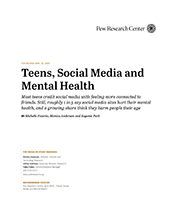
Balance, not Blanket Bans
Teens, Social Media and Mental Health by Michelle Faverio, Monica Anderson, and Eugenie Park
Pew Research Center, April 22, 2025
Pew’s April 2025 report offers a clear, nuanced snapshot of how U.S. teens experience social media and what schools can act on now. Many teens say they spend more time on platforms than they’d like, and the most commonly reported downsides cluster around sleep and staying on task. A meaningful share also connects social use to dips in mood and academic performance, with girls more likely than boys to report negative effects, particularly around sleep and mental health. However, the picture is not one-sided. Most teens also credit social media with helping them feel connected to friends, express creativity, and find acceptance and support. A notable subset turns to these platforms for mental-health information and considers them an important source. For independent school professionals, the takeaway is balance, not blanket bans. Build sleep and attention literacy into advisory and health curricula. Equip parents with language and norms that acknowledge both harms and benefits. Train faculty and deans to recognize gender-skewed experiences and intervene early. Partner counseling teams with student leaders to surface the mental-health content students encounter online. Pew’s research supplies data and language you can use with boards, faculty, and families as you calibrate policy, culture, and communication.


